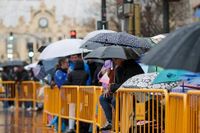On March 19, 2025, Spain celebrates Father's Day, coinciding with the festivity of San José. This day, recognized for honoring fathers, is linked to the figure of San José, the adoptive father of Jesus, who is seen as a model of fatherhood in the Christian tradition.
While Father's Day is not a national holiday across all of Spain, it is designated as a labor holiday in two autonomous communities: Comunidad Valenciana and Región de Murcia. In these regions, public and private sectors observe this day as a holiday, allowing families to come together and celebrate. According to the latest data from the National Institute of Statistics (INE), there are approximately 515,889 men named José in Spain, all of whom get a special mention on this day.
Father's Day has its roots in the traditions fostered by the Catholic Church, with Pope Pius IX declaring San José the Patron of the Universal Church in 1870. However, it was in the 1950s that Father's Day gained popularity in Spain as a secular celebration, largely due to the efforts of educator Manuela Vicente Ferrero. In 1948, she introduced the idea of dedicating a day to fathers after recognizing the unique role they play in society. "Estén seguros de que voy a inventar el Día del Padre" (Be assured that I am going to invent Father’s Day), she famously stated in an interview, foreshadowing the impact her initiative would have on Spanish culture.
Despite diverse practices throughout the country, Father's Day celebrations on March 19 often involve family gatherings where children express their love and appreciation through handmade cards, drawings, and small gifts. Typical presents include ties, watches, and tools, reflecting traditional gift-giving practices. In religious locales, masses in honor of San José are common, melding family and faith during this celebration.
This year, however, the calendar poses a unique challenge: March 19 falls on a Wednesday, limiting the opportunity for a long holiday bridge for many families. Celebrations will largely take place on this single day, though businesses and municipalities have reacted differently. In Murcia and the Comunidad Valenciana, while it is a day off for many, some shops, including major retailers, adjust their hours to cater to shoppers looking for last-minute gifts or family dining options.
For instance, El Corte Inglés will open its doors from 11 AM to 9 PM in its locations on Gran Vía Escultor Salzillo and Avenida de la Libertad, while notable fashion stores like Zara, Pull&Bear, and Mango will also open for limited hours, providing the chance for families to find gifts despite the holiday. Ikea has announced similar hours, opening from 10 AM to 9 PM, making it a great stop for families looking to combine a shopping trip with family activities.
In a notable exception, Carrefour will keep its stores open until 10 PM to accommodate shoppers. Supermarkets like Mercadona, however, will remain closed in the regions observing the holiday, upholding their policy of shutting stores on national holidays.
The popular and regional variations in celebrations illustrate the rich tapestry of how Father's Day is embraced throughout Spain. In addition to family meals and shopping, many engage in activities ranging from outings to local parks to movie nights, reinforcing familial bonds.
As society continues to evolve, so too do the celebrations surrounding Father's Day, reflecting both its traditional roots and modern interpretations. With changing family structures and increasing recognition of father figures in various forms, the holiday looks to the future, adapting to incorporate broader definitions of fatherhood while still revering the legacy of San José.
In summary, the coexistence of tradition and modern life on Father's Day in Spain paints a picture of cultural continuity and change. It shows the enduring significance of fathers while inviting fresh perspectives on what it means to be a father in today’s world. As the holiday greets families each March, it promises not only to honor fathers but to resonate through the very heart of Spanish culture.








